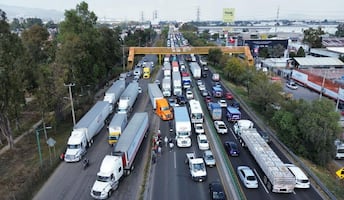Más Información

"El Güero Palma", fundador del Cártel de Sinaloa, tramita amparo; acusa incomunicación y tortura en el Altiplano

Van 279 mexicanos evacuados por conflicto de Medio Oriente; han salido desde Egipto, Jordania y Turquía: Sheinbaum

Paco Ignacio Taibo II desata polémica por dichos en evento de Iztapalapa; "todo el mundo tiene un primo o una prima pend...", dice

Sheinbaum: Pago de adeudos fiscales de TV Azteca y Elektra continúa pese a concurso mercantil; televisora ya pagó, señala

CDMX instala Gabinete con alcaldes rumbo al Mundial; Clara Brugada anuncia 2 mil obras y refuerzo de seguridad
Just as in the current conflict triggered by the U.S. decision to recognize Jerusalem as the capital of Israel, Mexico's Foreign Policy on the dispute between Palestinians and Jews has been consistent over the years.
Mexico, along with the world community, including Washington, supported the establishment of the State of Israel in 1948 after the Second World War, and played a leveling position by identifying Tel Aviv as the de facto capital of Israel , setting up the Mexican embassy there—Mexico-Israel relations can be traced back to 1952 —in addition to advocating for the right of Palestinian refugees to return to Jerusalem and the West Bank and, most importantly, by approving the creation of an independent Palestinian State in the territory occupied by the Hebrew forces in the War of 1967, based in the heavily-disputed Holy City of Three Religions .

During the Cold War , Mexico's Foreign Policy, based on a series of principles such as non-intervention , self-determination, peaceful settlement of disputes, and development promotion, encountered several difficulties with Israel and the international Jewish community derived from the war crises in the Middle East, and the colonization strategy in Jerusalem and the West Bank. In 1975 , for example, Mexico voted in favor of Resolution 3379 of the United Nations General Assembly , which defined Zionism, the philosophy of the Hebrew State, as racism, which led to a tourist boycott of American Jews against Mexico.
Mexico-Israel
relations had a noticeable improvement after the signing of a Free Trade Agreement between the countries in 2000 . However, incidents continued. This year, Israeli Prime Minister Benjamin Netanyahu sent a tweet in support of U.S. President Donald Trump ’s plan for a wall along the Mexican border while last year Andrés Roemer Mexico’s Ambassador to UNESCO was ceased because he abstain from voting on an—approved—initiative to preserve the cultural and religious heritage of the Temple Mount in East Jerusalem, which was later "corrected" with one abstention instead of a total vote.
Official visit
As a sign of the mature and ample relationship enjoyed by both nations, this year Netanyahu held an official visit to Mexico from September 13 to September 15, being the first visit of any Israeli Head of State in the country. Netanyahu met with President Enrique Peña Nieto seeking to modernize the bilateral Free Trade Agreement and sign several agreements on air services and international cooperation for water, agriculture, entrepreneurship, and innovation, and Peña Nieto thanked the help provided after Mexico's earthquake on September 7, which would increase with the dispatch of a rescue team after the second earthquake on September 19.
"Mexico's President Enrique Peña Nieto welcomed Israeli Prime Minister Benjamin Netanyahu," the tweet reads.
Nonetheless, Mexico’s Foreign Ministry ( SRE ) was very clear in announcing on December 6 that Mexico will keep its embassy in Tel Aviv, a decision in accordance with the 1980 Security Council Resolution 478 and the UN General Assembly resolutions on the status of Jerusalem, and 1993 Oslo Accords .
“Mexico supports dialogue as the means to resolve the Israeli-Palestinian dispute, based on the two-State solution , that is, the right of Israel and Palestine to live in peace within secure and internationally recognized borders, and reiterated the need for direct negotiations without preconditions between Israelis and Palestinians," the statement read.
For its part, Mexico-Palestine relation has remained moderate, since in Mexico, as in Ramallah , West Bank , headquarters of the Palestinian National Authority ( PNA ), representative offices of both parties are accredited without reaching embassy level. Yasser Arafat ( 1929-2004 ), a historic Palestinian leader, did not visit our country, a situation that has been repeated with Mahmoud Abbas , current president of the PNA. However, Riad Malki , PNA's Foreign Minister , held three official visits in 2009, 2011 and 2012; in the latter, he was present when Enrique Peña Nieto took office.
Editing by Sofía Danis
More by Gabriel Moyssen
Noticias según tus intereses
[Publicidad]
[Publicidad]









